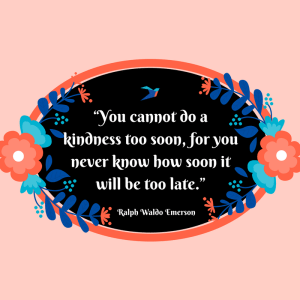
President John Kennedy said “Everyone can make a difference and everyone should try.” That’s a very true statement, all of us can make a difference, we just need to decide what kind of differences we want to make.
I don’t think I can change the world but I know I can help change the world for the people I help. So I try to make a difference by helping other people be the best version of themselves that they can be.
Making a difference can take many forms, and the impact one person can have varies depending on the context and scale of their actions. The higher you are in your organization the easier it may be to make a difference. If you’re in a position of leadership in an organization or perhaps government you might find more opportunity to be a difference maker. But make no mistake about this absolute fact: no matter where you are in life, no matter your place in an organizational hierarchy, no matter your level of education or financial situation, YOU can make a difference in the lives of other people. You only need to care enough to do it.
So, if you’re looking to make a difference today and in the future here are some general steps and principles that you can follow to make a positive difference.
• Define Your Values and Passion: Understand what matters to you and what issues you are passionate about. This could be related to social justice, environmental issues, education, healthcare, or any other cause.
• Educate Yourself: Learn about the issues you care about. Stay informed through reputable sources, research, and conversations with experts. Understanding the root causes and complexities of a problem is crucial for effective action.
• Start Locally: Making a difference doesn’t always require grand gestures. Look for opportunities in your local community. Volunteer at local organizations, participate in community events, or support local initiatives.
• Use Your Skills and Talents: Identify your skills and talents and find ways to apply them to the causes you care about. Whether you’re good at organizing events, writing, coding, or any other skill, there’s likely a way to use it for positive change.
• Connect with Like-minded Individuals: Join or create communities that share your values. Collective action often has a greater impact than individual efforts. Working with others allows you to pool resources, share ideas, and amplify your impact.
• Advocate for Change: Speak up about the issues that matter to you. Advocate for change at different levels, whether it’s in your workplace, community, or on a larger scale. Use social media, write articles, or engage in peaceful activism to raise awareness.
• Support Existing Initiatives: There are likely organizations and initiatives already addressing the issues you care about. Support them through donations, volunteering, or spreading the word. This can be an effective way to contribute without having to start something from scratch.
• Lead by Example: Demonstrate the values and behaviors you want to see in the world. Whether it’s practicing sustainability, kindness, or inclusivity, leading by example can inspire others to follow suit.
• Be Adaptable and Persistent: Real change often takes time. Be patient and persistent in your efforts. Adapt your strategies as needed and learn from both successes and failures.
• Educate Others: Share your knowledge and passion with others. Help raise awareness and inspire more people to get involved. Education is a powerful tool for creating change.
The key is to take meaningful and sustainable actions aligned with your values. Making a difference is often a gradual process. But every small effort contributes to positive change over time. Progress doesn’t often happen in leaps and bounds. It often comes from small accomplishments over a sustained period of time. But all progress is progress and a little progress here and a little progress there, can lead to a mighty big difference over time.

 Sir Winston Churchill said “We make a living by what we get. We make a life by what we give.”
Sir Winston Churchill said “We make a living by what we get. We make a life by what we give.”